GREEN HOME-Stop recycling! Local haulers want to do it for you
You’ve been doing it for years—dutifully separating recyclables from your trash, rinsing jars and removing caps, tying your cardboard, and placing them in the assigned bin if you use the City’s curbside service; the guidelines for which you have memorized.
You also use the McIntire Recycling Center, the Paper Sort facility, and the Ivy Transfer Station and keep track of special collections days for bulky waste items, electronics, and hazardous waste. You take your metal to Coiner’s Scrap, your plastic shopping bags back to the grocery store, your clothes to Goodwill, your styrofoam and bubble wrap to Mail Boxes Etc. or Pack N Mail, your used construction items to the Habitat Store, and your used ink cartridges to Staples. You are dedicated to recycling. You are greener than thou.
Okay, maybe you’re not.
Maybe you’re lucky to get a few bottles, cans, and some paper out to the curb before you have to rush to work, or only have time for a few runs to the McIntire Recycling Center each month. Maybe you’ve got a big bin of recyclables at home you’ve been meaning to get rid of. Maybe, to be honest, you find recycling to be a pain in the…
Don’t feel bad. You’re not alone.
Despite how “hip” it has become to recycle, according to the Environmental Protection Agency’s latest figures, only 33.2 percent of the 250 million tons of trash generated by Americans gets recycled. Locally, the Thomas Jefferson Planning District Committee puts the recycling rate at 34 percent. What’s more, the average American now throws away 4.5 pounds of trash every day, compared to just 2.7 pounds in 1960. But you know that. You know how fast your kitchen trash can fills up. Basically, our elaborate efforts at recycling have been undermined by our capacity to create more and more trash.
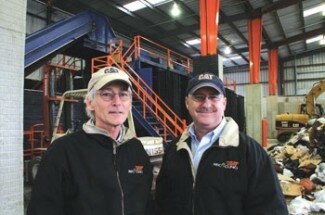 Peter Van der Linde and his chief of operations, Michael Ledford, stand in front of the “dirty MRF,” which separates recyclables from the household waste stream
Peter Van der Linde and his chief of operations, Michael Ledford, stand in front of the “dirty MRF,” which separates recyclables from the household waste streamFILE PHOTO BY DAVE MCNAIR
“The demands of source separation have been the biggest impediment to participation in recycling,” claims Peter Van der Linde, who believes his state-of-the art Material Recovery Facility (MRF) in Zion Crossroads is a solution to the problem. “Consequently, most of the population doesn’t even attempt to recycle.”
However, now that many local trash haulers have dumped the services of the Rivanna Solid Waste Authority in favor of using Van der Linde’s new MRF, giving up on recycling could be the best way to recycle.
Say what?! Allow us to explain.
After surviving a $20 million RICO law suit brought against him by the RSWA— which was supported by both local governments and finally settled out of court in January— Van der Linde has been able to focus on operating his “landfill of the future,” which uses two state-of-the-art recycling machines, combined with hand labor, to sort and recycle construction and demolition debris, commingled recyclables, and even household trash.
Because all the sorting and recycling is done at Van der Linde’s facility, customers of those local trash haulers— including Dixon Disposal, Time Disposal, SDI Disposal, Fluvanna Disposal, Kingrea’s Disposal, M&M Disposal, All American Trash Services, Ace Disposal, and Sandridge Disposal— can simply throw everything into one big bin. According to Boyd McCauley of Time Disposal, many of his customers don’t even know they’re recycling.
“Van der Linde has changed everything,” McCauley told the Hook. “Even our customers who don’t recycle are now recycling. It don’t get no easier.”
Indeed, even when you attend a concert at the Pavilion or the Jefferson Theater, you’re recycling with Van der Linde.
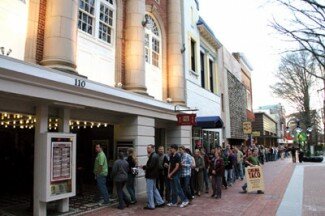 Concert goers at the Jefferson Theater may not know it, but they’re supporting Van der Linde’s facility every time they see a show.
Concert goers at the Jefferson Theater may not know it, but they’re supporting Van der Linde’s facility every time they see a show.FILE PHOTO BY TOM DAILY
“It’s saving us a ton in labor costs,” says Kirby Hutto, manager of the two music venues, on why he chose to dump the City’s trash service and partner with Dixon Disposal. “We had to pay our staff to sort recycling, but once we switched to Dixon we didn’t have to do that. ”
For about the same cost of city trash decals, Hutto says Dixon will pick up trash when the bins are full, not only during scheduled routes. What’s more, because there was such a large volume of trash generated at the Pavilion, Hutto says the City wouldn’t allow it to use the McIntire Recycling Center, leaving the Pavilion with few recycling options. Now all the trash and recycling generated by the 3,500-person venue is sorted at Van der Linde’s facility.
“As far as trash collection and recycling goes, this is transformational,” says Hutto. “There’s a new game in town.”
Waste of money?
Apparently, our local governments didn’t get the memo. The County recently decided to support the RSWA for another year to the tune of $350,000, while the City is still locked into agreements with the financially ailing Authority and its corporate partners, Waste Management and BFI/Allied/Republic, to the tune of around $2.6 million a year.
Last February, after giving interested companies just 15 days to respond to an Invitation to Bid, the city signed a five-year contract worth $3.7 million with Waste Management to collect household trash. Two months later, the city renewed a one-year contract with BFI/Allied/Republic Services worth over $400,000 a year to collect curbside recycling, with four more renewal options available to the company. In addition, the city pays over $900,000 a year in disposal fees to the RSWA.
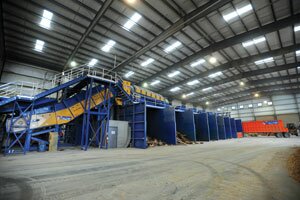 Van der Linde’s “landfill of the future” is changing the landscape of the local trash business.
Van der Linde’s “landfill of the future” is changing the landscape of the local trash business.FILE PHOTO BY JEN FARIELLO
Under the contract, Waste Management must bring city trash to the Authority-sponsored BFI/Allied/Republic transfer station in Zion Crossroads (which happens to be right next to Van der Linde’s MRF), due to the city’s service agreement with the Waste Authority. From there, the trash is trucked 77 miles away to a BFI landfill, while the City’s curbside recycling, picked up by BFI/Allied/Republic and sorted at its transfer station, is supposedly trucked 87 miles away to a MRF in Chester, Virginia.
Waste Management also has a $1.4 million annual contract with the RSWA to haul waste loaded in trailers at the Ivy Transfer Station to a company’s landfill in Amelia, Virginia, and the RSWA also pays BFI/Allied/Republic $675,000 annually for the services of its Zion Crossroads transfer station.
Of course, as trash haulers that own giant holes in the ground, BFI/Allied/Republic and Waste Management are clearly not inclined to pay to use Van der Linde’s MRF.
In fact, Van der Linde began ruffling feathers the moment he broke ground. Last December, Valley Department of Environmental Quality waste manager Graham Simmerman, who issued Van der Linde his permits, revealed that “people were trying to use our agency to irritate Mr. Van der Linde.”
Simmerman described the many anonymous, unfounded complaints his office received about the facility since it first broke ground, which he believes came from “players in the trash business” and happened because the facility was “upsetting the status quo” by diverting waste “away from the RSWA and BFI.” RSWA and BFI claim innocence.
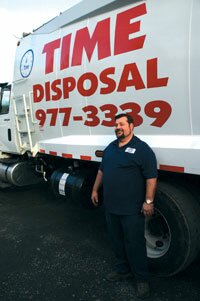 Private haulers like Time Disposal’s Boyd McCauley are making the big boys sweat.
Private haulers like Time Disposal’s Boyd McCauley are making the big boys sweat.FILE PHOTO BY DAVE MCNAIR
With more homeowners (Van der Linde reports that the Lake Monticello community, home to 4,200 homes, is currently discussing going with him via local haulers) and businesses like the Jefferson Theater and the Pavilion going with local haulers aligned with Van der Linde, tonnage rates— and therefore tipping fees— at the government-sponsored transfer stations have been declining. Tipping fee revenues were down $364,000 in the RSWA’s 2007-2008 budget cycle, before Van der Linde opened his facility, but that figure jumped to $758,000 the following year after Van der Linde opened. Currently, the Authority is attempting to save itself by privatizing the operation of the Ivy Transfer Station, having issued a Request for Proposals in January. To date, no proposal has been selected.
Meanwhile, the City appears to be contemplating closing the money-losing McIntire Recycling Center and ending its agreement with the beleaguered Authority, which expires at the end of June.
“That’s providing us a rare opportunity, a welcome one in my book, to take a comprehensive look at our solid waste management system,” says Charlottesville Mayor Dave Norris, “and consider ways we might reform it to reduce costs and steer more materials away from the landfill.”
However, while the governments continue to plan and discuss, local haulers may have already made those plans obsolete.
Trashformation
If the city were to simply allow local haulers like Dixon to take over, the expensive budget for “waste collection services” could potentially be reduced to zero. Plus, Van der Linde’s facility could potentially steer approximately 3,000 tons of city household trash away from landfills, recycling rates could increase, and trash service might actually be cheaper for city residents.
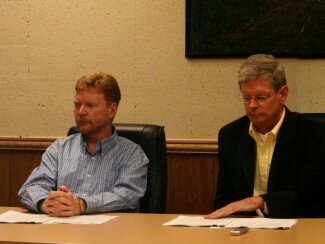 “Everything’s on the table with regard to how we collect and dispose of or recycle solid waste in the City,” says Norris. “Including privatization.”
“Everything’s on the table with regard to how we collect and dispose of or recycle solid waste in the City,” says Norris. “Including privatization.”FILE PHOTO BY HAWES SPENCER
For example, Dixon is currently charging city residents $19 per month to pick up a 96-gallon container of trash and recycling every week, which adds up to $228 per year. That’s $55 less than the $283 cost of an annual city trash decal for a 96-gallon container.
Of course, the city’s “pay as you throw” sticker system, which generates about $1 million a year, allows people who don’t generate a lot of trash, or who strive to recycle more, to save money as they save the planet, as 13-gallon stickers can be purchased for just $1.05.
“Our household of two, using free curbside, puts out a large can of household trash every three weeks,” says City Councilor David Brown, who sits on the RSWA board and claims that he spends only $3 a month on trash stickers.
“I think this issue needs a lot of looking into,” says Brown of a possible deal with Van der Linde. “If we can achieve a good recycling rate with a MRF, great. But let’s make sure before we move in that direction.”
However, as Van der Linde points out, under the existing system, the recycling rate for the approximately 7,800 tons of city household trash collected every year is exactly zero percent.
“The recycling rate for our dirty MRF isn’t perfect, yet,” he says, “but isn’t it better than all of it going to the dump?”
As Van der Linde explains, his survival depends on diverting as much as he can away from a landfill, thereby avoiding tipping fees and associated transportation costs.
“The more material we send to the landfill, the higher our cost of operation,” he says.
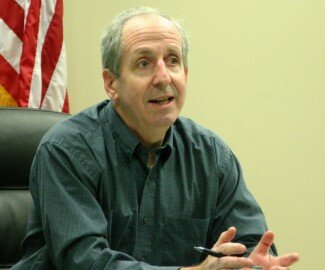 “Maybe the best system would be to continue to offer curbside recycling,” offers Brown, “but put all remaining trash through a MRF.”
“Maybe the best system would be to continue to offer curbside recycling,” offers Brown, “but put all remaining trash through a MRF.”FILE PHOTO BY HAWES SPENCER
In addition, Van der Linde says there’s money to be made in a steadily expanding local market for recyclables, including cardboard, paper, metals, wood products, plastics, commingled recycling, brick, block, concrete, and drywall. He also mentions that a new $5 million tire recycling facility recently opened in Louisa County.
Van der Linde claims his current recovery rate for construction and demolition debris is consistently 90 percent, that the rate for commingled recyclables (recyclables that have been separated by businesses or home owners) is 95 percent, and the rate for household trash is currently at 38 percent, a number he hopes to raise with recently-purchased equipment.
But Brown wonders if Van der Linde’s facility could handle the 7,800 tons of trash the City generates, plus all the recycling and construction and demo debris. And what about the quality of recyclables collected this way? Doesn’t much of it get contaminated?
Van der Linde claims his permit allows the facility to process a thousand tons per day. He admits that recyclables get contaminated, as some “pretty weird things end up in there,” but he also points out that much of it gets contaminated before it gets into the trash can— bottles containing cigarette butts, oil-soaked pizza boxes, and uncleaned peanut butter jars, for example. In the end, he says, the potential increase in the overall recycling rate among the local population as a result of his facility more than makes up for the amount that gets contaminated.
What’s more, he says his facility has a newly installed recovery system for contaminated materials, which are sent to a massive ‘waste-to-energy” facility in Harrisonburg that heats and cools the James Madison University campus by burning household waste.
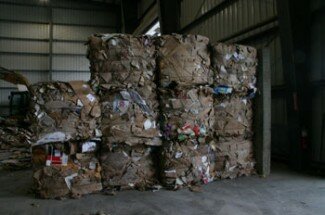 Back in December, Van der Linde’s facility pulled 40 tons of cardboard—each bale shown here is a ton—from the household waste stream. At the time, markets in China were paying $20 per ton for the stuff, but just recently, says Van der Linde, that number spiked to $185 per ton.
Back in December, Van der Linde’s facility pulled 40 tons of cardboard—each bale shown here is a ton—from the household waste stream. At the time, markets in China were paying $20 per ton for the stuff, but just recently, says Van der Linde, that number spiked to $185 per ton.FILE PHOTO BY DAVE MCNAIR
As a recent article in the New York Times pointed out, a 2009 EPA study favored these waste-to-energy plants over landfills “as the most environmentally friendly destination for urban waste that cannot be recycled.” In Europe, the Times noted, there are about 400 such plants producing heat and electricity, many of them state-of-the-art, while there are only 87 plants in the United States, nearly all of them built more than a decade ago.
“Maybe the best system would be to continue to offer curbside recycling,” offers Brown, “but put all remaining trash through a MRF.”
However, as Van der Linde mentions, dedicated recyclers like Brown can reduce the chance of contamination by simply putting food waste in one bag and everything else in another. More importantly, though, by dropping them both in one container, it eliminates the need to run two separate pick-up routes.
The appeal of working with Van der Linde, says Dixon’s Randy Dixon— besides not having to run a separate route for trash and recyclables, which had made offering curbside recycling cost-prohibitive— is feeling confident about telling his customers that their stuff is getting recycled.
 City trash and curbside recycling comes here, to the BFI/Allied/Republic transfer station beside Van der Linde’s MRF. But where does it go?
City trash and curbside recycling comes here, to the BFI/Allied/Republic transfer station beside Van der Linde’s MRF. But where does it go?FILE PHOTO BY JEN FARIELLO
In contrast, while BFI/Allied/Republic told the city they collected 3,332 tons of curbside recyclables last year, the city has no idea how much of that actually gets recycled. Under the city contract, the company basically “owns” the recyclables once they get picked up on the curb, and is under no obligation to report what’s done with them.
“We have no reason to question that all of our materials are recycled,” says city public works director Judy Mueller, though she admits to not knowing what and exactly how much actually gets recycled in Chester.
However, some of the haulers the Hook spoke to have been questioning how much the City and BFI/Allied/Republic actually recycles for some time, which is why they says they were happy when Van der Linde’s facility finally opened.
“I know it’s being recycled at Pete’s place,” says Dixon.
Meanwhile, the self-proclaimed “green” city of Charlottesville continues to pay big bucks to have 7,800 tons of the trash thrown in a landfill.
However, there might be a way out. According to the contract with Waste Management, the city can terminate the agreement at “any time” and “for any reason” with 30-days notice.
So might the City dump the RSWA and its corporate partners in favor of our local haulers?
“Everything’s on the table with regard to how we collect and dispose of or recycle solid waste in the City,” says Mayor Norris, who mentions that City Council held a work session on waste disposal April 19, after this special section of the Hook went to press. “Including privatization.”
Update 4/22/2010 3:46pm: Charlottesville Tommorow provides a podcast of the April 19 Solid Waste work session.
More GREEN HOME– eBikes: Recent advances make ‘em viable for Charlottesville
Concerned about slowing down automobile drivers on the Belmont Bridge, City zoning inspector Craig Fabio used to avoid making his rounds on his old Schwinn. Today, however, Fabio bicycles confidently over that same bridge on his way to inspections.
The difference? Fabio now gets a boost from the City newest green addition: a pair of bicycles whose pedals literally leap when he shifts on his onboard battery pack. Rather than fight the bridge uphill, he now cruises without strain. READ MORE
Download files »
- http://www.tjpdc.org/Recycle/pdf/Recycle%20Infosheet.pdf


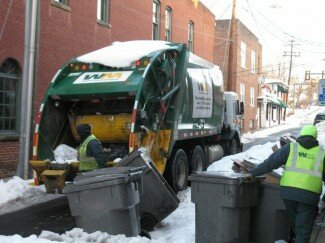





We thank Van der Linde from taking his trucks off of Route 250 in Fluvanna County from listening to residents and instead taking I-64 at Zions Crossroads, per special use permit requirements. However, we are concerned about the increase in the amount and frequency of private haulers constantly taking I-64 at Boyds Tavern and using Route 250 in Fluvanana County to get to these facilities when the I-64 exchange at Zions makes more sense. Just look at the trash littering the sides of the road along Route 250 in Fluvanna County. Please be good stewards to Fluvanna County residents by taking I-64 at Zions Crossroads thus restoring peace, quiet, safety, avoid further road deterioration, and a clean community for Fluvanna residents to live in which was before these facilities were approved. After all at least three (3) school buses travel Route 250 plus residents need safe access to and from their driveways. Taking I-64 at Zions would have very little impact on residences and school buses. How would you like to hear roaring trucks at 6:00 in the morning going by your residence? We understand if you are doing weekly pick ups for those who live on the road or on connecting secondary roads. But, come on, Monday through Saturday, constantly using Route 250. Most private haulers pick up trash on Mondays, Wednesdays, and Thursdays along Route 250.
that man/woman has a point. Quit being ehsholes and take the damn interstate
Whine whine whine. We want to protect the environment but only if it doesn’t disturb my afternoon nap. Just like the “we want to stop using foreign oil and coal, but I don’t want a nuclear plant near me” people. Quit being ehsholes and do what is right for the planet, quit being simple minded self-centered and get on board. It is earth day for heaven’s sake.
In response to Concerned Environmentalists: Trash is unnecessary being littered along the sides of the roadway on Route 250 in Fluvanna County from these big, loud, smelly, heavy trucks. This is from speeding down Route 250 with overloaded and/or uncovered full or empty trucks. How is littering trash along with roadway on Route 250 environmetally friendly?! After all we have well water. It is not like they don’t have an alternate route to take. They should be taking I-64 at Zions Crossroads. There are only businesses in that area not residential except for Spring Creek Subdivision which is way off of the road and the school bus goes into the subdivision to pick up students. The Fluvanna County school buses stop along Route 250 to pick up students. These trucks are a definite safety issue to those that live in the area and most have most of their lives. We didn’t want these facilities approved. However, Fluvanna County did it anyway. At least these haulers can do is actually show concern for the environment and Fluvanna residents by not littering and speeding and take I-64 at Zions Crossroads. We clocked the mileage and they are only one (1) mile away from Zions Crossroads. We will ask again: How would you like to hear these big, loud, trucks at 6:00 in the morning (did not state “afternoon”)?! You don’t know anything about the situation since you probably don’t live near these facilities. Take a drive in the area Monday through Friday, at your leisure, and you will see why we are complaining. Prisoners have to pick up the trash that is littered but not after it has accummulated and citizens start complaining. They don’t even pick up their own trash!
I hope we can at least figure out a way to keep the book exchange trailer somewhere. It’s absolutely one of my favorite things about Charlottesville, silly as it may seem. I love bringing my books there once I’m finished with them and seeing they are gone the next time I come, and I love leaving with a few new ones to me every time I leave it.
in response to Concerned troy residents. it would seem to me that the trucks driving by your house at 6am would be those of bfi leaving the yard for work, which happens to be right beside van der lindes facility, not those of local haulers taking their daily routes worth of trash out to the mrf before they start their route in the morning. also i dont know when the last time was that i saw an uncovered trash truck. i’m pretty sure they have passed laws recently that mandate those trucks to be covered whether full or empty. and being someone that grew up in this area and on the east side of town i know that there are very few homes close enough to the road to truly be affected by passing vehicles. and as far as the safety of the kids getting on and off those busses on 250, there are more issues with drivers of private vehicles then those of small trash haulers on a state highway like 250. get over yourself and try to support a change for the better. your concerns and complaints make it sound to me like your a bfi employee, or are in some way affiliated with them, the rswa or waste management.
Recall the acronym- NIMBY……
In response to tired of whiners: Believe me we are not BFI employees, we are not affiliated with any of them, and expressed our displeasure when they were up for approval in Fluvanna. We would never work for BFI, Waste Management, or RSWA under any circumstances. I am a lifetime Fluvanna resident. We were present during the Board of Supervisors meeting when BFI was up for approval of their faciity. They promised, in front of us, that they would mostly take Interstate 64 not Route 250 and recycle most of the debris. We knew they were fibbing and I yelled out “Yeah right.” Sure enough they did not/are not doing what they promised. As far as the private haulers are concerned they do take the I-64 exchange at Boyds Tavern then Route 250 through Albemarle and Fluvanna (approximately 7 miles on 250) instead of I-64 at Zions Crossroads. If this is not the case then why do we see them everyday, Monday through Saturday?! If they are picking up local trash then we should only see them three days a week. Before these facilities were built we didn’t any large trash haulers and hardly any private haulers unless they were picking up citizens trash. Don’t get us wrong we believe in recycling and are happy that Van der Linde is there as a better alternative to BFI. But, we see big haulers all the time empty and uncovered or over filled and covered. Debris have flown in front of driver’s view and it is dangerous. This has happened to me and several other citizens traveling in the area. If this not the case then why are we constantly picking up debris in our front yard? Plus, why do we continue to see debris along the sides of the road along Route 250 and in the revenes? Just because it is a law concerning covering the trucks that doesn’t mean they are following it! Plus, there is hardly any Police presence to enforce it. We live at least five miles away from these facilities and see the negatives everyday. Once again, what would you do if the shoe was on the other foot and these facilities were this far away from your home and you had to put up with all of this? I am sure you would be complaining. This is the only method we have to get our thoughts out in the open. Nobody in Fluvanna County government or from BFI will listen to us. At least Van der Linde did. May be some of the private haulers will?
When will our officials wake up. Continuing to use these big land-fill based trash haulers is not only environmentally unsound, but financially ridiculous –why don’t they see this ?
[...] Read more on The Hook [...]
why dont you all just shut up and make your own darn trash hauling company then you see how it is. huh? how bout that?
[...] Read more on The Hook [...]